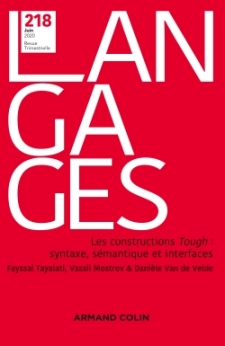
Langages Nº 218 (2/2020)
Pour acheter ce numéro, contactez-nous
Recevez les numéros de l'année en cours et accédez à l'intégralité des articles en ligne.
En russe, les adjectifs signifiant ‹facile›, ‹difficile›, accompagnés d’un infinitif, ne présentent pas le phénomène de Object-to-Subject Raising (Rosenbaum 1967) puisque l’objet monté garde le cas qui lui est assigné par l’infinitif. La montée consiste donc en un simple changement de l’ordre des mots. Néanmoins, malgré l’absence d’une construction Tough sur le modèle de l’anglais, les adjectifs russes trudnyj ‹difficile›, legkij ‹facile›, etc. présentent des particularités par rapport aux autres adjectifs dans la mesure où ils sont les seuls à pouvoir entrer dans trois autres constructions : le passif réfléchi, le participe présent passif et une construction prépositionnelle en dlja ‹pour› + Ndéverbal. L’aptitude de ces adjectifs à entrer dans ces trois constructions confirme leur propension aux phénomènes de montée, due à leur affinité sémantique avec la modalité.
In Russian, the adjectives meaning ‹easy›, ‹difficult›, accompanied by an infinitive, do not allow Object-to-Subject Raising (Rosenbaum 1967), since the raised object keeps the case assigned to it by the infinitive. Its raising is, therefore, a simple change in the word order. Nevertheless, despite the absence of a Tough construction on the English model, the Russian adjectives trudnyj ‹difficult›, legkij ‹easy› and the like differ from other adjectives in that they are the only ones to be compatible with three other constructions: the reflexive passive, the passive present participle and a prepositional construction in dlja ‹for›+deverbal noun. The compatibility of these adjectives with the three aforementioned constructions confirms their propensity to raising phenomena, which may be explained by their semantic affinity with modality.